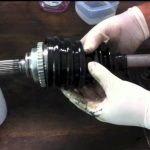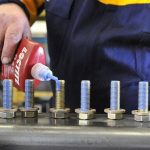
The brake pedal in a car helps to control the movement of the car. You can decide to make the car go faster or slower just by pressing down on it.
It can become stiff and unmoving as a result of some problems in the car such as; not enough vacuum, and a bad check valve amongst others.
When this happens, the best thing to do is to find out what the real cause of the stiff pedal is and fix it. In trying to fix the problem, some replacements may be necessary while others don’t require replacing any part.
Causes of Stiff Brake Pedals
Here are the causes of stiff or hard brake pedals:
1. Bad Check Valve
One of the major causes of stiff brake pedals is a bad/defective check valve in the brake system.
The valve is circular in shape and helps to hold the vacuum created by the engine in the brake booster, it allows vacuum pull against the booster but doesn’t allow it to go the other way.
One way to know if the valve is the cause of the stiff pedals is by checking, to do this, you will need to have the valve removed from the booster and then disconnect it from the hose. A bad valve will allow air travel all the way to the other side of the hose.
2. Vacuum Not Enough
Vacuum in an engine is used to power the brakes by increasing the pressure applied to the pedals which makes braking very easy.
Over time, there may be problems with the front and rear seal in the brake booster resulting in low vacuum, when this happens, it becomes hard to move the pedal. The solution here will be to replace the master cylinder brake booster.
3. Bad Brake Booster
Another common cause of a stiff brake pedal is a bad brake booster. If the problem is with the booster, you are most likely dealing with a diaphragm problem.
A problem in the booster makes it impossible for the booster to house a vacuum. To know if the stiff brake pedal is a result of a bad booster, you will need to check the booster but before doing any checks ensure the engine isn’t running.
4. Using the Wrong Hose
The cause of a stiff brake pedal could also be using the wrong hose, either the wrong type of hose is running to the booster, or the hose in use is of low quality or even aged as a result of use.
If the problem is from the hose you will need to get it replaced. The right vacuum hose is usually designated with _/32” and sizes ranging from 7 to 9 to 11.
How to Fix Stiff Brake Pedals that Cause Car Not to Start
An easy way to find a fix to the problem of a stiff brake pedal causing a car not to start is by first considering the various causes and then finding the solutions.
Bad Battery
A bad battery will prevent the car from starting, it may, however, provide enough power for some accessories in the car like the dash light, door locks, etc. to function.
If the cause of stiff brake pedals and the car not starting is a bad battery, you will need to jump-start the car or do a battery replacement.
The Starter is Bad
If a car doesn’t start, it could be that the car starter is bad. A starter is an important part of a car without which the engine and its components will not function. It is used in internal combustion engines for rotation in order to initiate engine operation.
If the starter is bad, you will most likely hear a clicking sound when turning the ignition key and the brake pedal also becomes stiff in this case you will need to get a replacement or have the starter fixed.
Bad Neutral Safety Switch
A bad neutral safety switch will cause the car not to start. The purpose of the neutral safety switch is to tell the computer what gear the shifter is in, when it is in this gear, the car is only allowed to start in neutral or park.
In order to be sure this is the problem, move the shifter in different positions while you are trying to start the car. If it turns out the neutral safety switch is bad, a replacement will be needed.
Blown Fuse
The fuse is an important part of an engine that helps to protect some electrical components such as the engine and brake functions amongst others.
Over time, the fuse may get blown or missing; if either of these happens it could result in the car not starting.
An easy way to tell if the fuse is the problem is by pulling them out one after the other and checking the connection between the terminals. To fix a missing or blown fuse situation, you will have to get a replacement.
Brake Vacuum Booster
Brakes in the car are vacuum-assisted i.e. they function with the help of a vacuum which can only be generated when the engine is running.
When the engine is off automatically no vacuum is generated which means it becomes difficult for the brake pedal to move.
If this is the case, you may need to get a mechanic to check out the vacuum for leakage and also test the brake booster.
Cost to Fix Stiff Brake Pedals
A major determining factor of the cost of fixing stiff brake pedals is the cause. As there are different causes of stiff brake pedals, their cost of fixing will also vary.
One of the cheapest to fix is the fuses. If the fuse is the problem, you won’t need to spend so much to have it replaced.
Of all, replacing the brake vacuum booster may be the most expensive as you will be spending between $150-$300 to have it replaced.
Getting a new battery in the event that the problem is with the battery you will spend between $100-$200 depending on the specifications.
The cost of replacing the ignition switch varies and depends on the car maker. For some switches, the car makers have it as part of the lock assembly while some others are easy, cheap, and free-standing.
To replace a bad starter motor, you will spend between $60 to $150 excluding the cost of labor which in some cases can be as high as the cost of the new starter.
Conclusion
To figure out the real cause of the stiff brake pedal that has prevented your car from starting, take the car to an auto shop as they are in the best position to figure out the problem.









